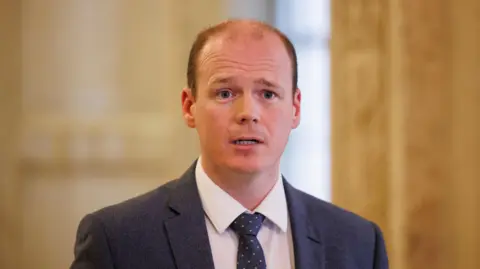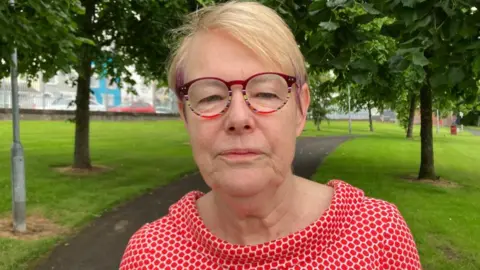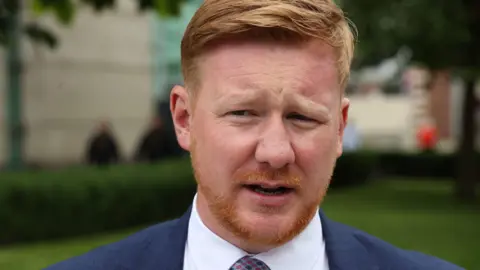Charities call for executive to drop 'harmful' anti-poverty strategy
 Getty Images
Getty ImagesAlmost 50 charities and anti-poverty organisations are calling for the Northern Ireland Executive to withdraw its draft strategy to tackle poverty, saying that families "deserve better".
An anti-poverty strategy was first committed to by Stormont 19 years ago, but the first-ever plan was only agreed by executive parties last month.
A letter to Stormont ministers said it is "more harmful to have a strategy that will not address poverty, than no strategy at all".
In a statement, the Department for Communities (DfC) said the strategy was the "culmination of hard work and collaboration" from a broad range of groups "including the anti-poverty co-design group".
Groups including Save the Children, the Northern Ireland Council for Voluntary Action (NICVA), the Ulster Farmers Union (UFU) and trade unions are among signatories of the letter.
The anti-poverty strategy was released for public consultation earlier in June for a period of 14 weeks.
Democratic Unionist Party (DUP) Communities Minister Gordon Lyons, whose department has responsibility for the document, said the plan was "realistic", given the financial constraints Stormont departments are operating in.
When the plan was agreed in May, First Minister Michelle O'Neill said it probably could "go further" but denied there was a row between Sinn Féin and the DUP over it.
 PA Media
PA MediaWhat is in the Northern Ireland poverty strategy?
The 28-page paper sets out the executive's approach to tackling poverty over the next 10 years.
It outlines efforts already being taken by various departments to help minimise the risks of people falling into poverty in Northern Ireland, as well as reducing its impacts and ways to help people get out of poverty.
The document states that poverty is "not a problem which the executive can solve in isolation", but one that requires community groups, business, councils and voluntary groups to help.
It adds that the strategy will be accompanied by a programme of delivery to be updated on an ongoing basis.
 PA Media
PA MediaHowever, Trasa Canavan, from Barnardo's NI, said the anti-poverty draft strategy "is not a strategy".
Ms Canavan, who is also the chair of the Anti-Poverty Strategy Group, said: "The Northern Ireland Civil Service produced guidance and policy making in 2023 and said 'a strategy without an action plan is wishful thinking' and that's exactly what this is.
"We don't doubt the intentions of our politicians and our civil servants to eradicate poverty in Northern Ireland but this strategy will not achieve that."
Asked on BBC Radio Ulster's Good Morning Ulster programme what needs to change in the strategy she said that outcomes, targets and commitments are needed.
Ms Canavan said "brave changes" need to be made because "as a society" we are "paying for poverty in one way or another".
She added that the Anti-Poverty Strategy Group would work with the government on developing a better strategy, because "poverty eradication" is "important".
'It isn't a strategy'

Speaking to BBC Radio Foyle's North West Today programme, Goretti Horgan, chair of the Northern Ireland Anti Poverty Network, also said the draft strategy "isn't a strategy at all".
She said the consensus among those who have signed the letter is that "particular things that need to be there for it to be a strategy" are lacking.
"Things like targets that are specific, that you can measure and that are time-bound. A strategy is supposed to lay out a plan.
Ms Horgan added: "We cannot respond to the consultation on something that actually isn't a strategy."

The chair of the Public Accounts Committee and SDLP MLA Daniel McCrossan agrees with Ms Canavan's remarks.
"It is very clear from what has been introduced that it falls short of what any of us were expecting.
He added that it was "insulting" and "the minister and department" had "wasted" the time of "experts and those people at the coal face...that are on the ground, who have been working with the department, making recommendations and offering guidance".
Sinn Féin assembly member Colm Gildernew described the draft strategy as "undeniably weak" and said it "fails to address the real challenges faced by vulnerable families in our communities".
He called on the communities minister "to listen to the widespread concerns" raised and engage with "these groups who have the skills, knowledge, and experience to help shape a strategy that truly delivers for those who need it most".
DUP assembly member Brian Kingston told BBC Radio Ulster's The Nolan Show his party does not think it would be "beneficial" to withdraw the draft strategy as it will "set back the process".
He said it had been "endorsed to go out for consultation" by the executive and that an action plan would follow in due course.
What does the letter say?
It states that those who have signed it want to share their "dismay and frustration" at the draft strategy.
It adds: "The undersigned agree that the Northern Ireland Executive's draft Anti-Poverty 'Strategy' does not meet the criteria of a reasonable strategy.
"It fails to fulfil what oversight bodies, including the NI Audit Office and Public Accounts Committee, outline as the basic elements of any strategy."
They are critical that it does not include defined and specific actions or targets.
"We are committed to working with you in good faith to eradicate poverty in Northern Ireland, and therefore, we are asking the NI Executive to withdraw their support of the draft Anti-Poverty Strategy, on the basis that it is more harmful to have a strategy that will not address poverty, than no strategy at all.
"Our children, families and communities – your constituents – deserve better."
In a statement, a DfC spokesperson said the minister has "listened carefully to the recommendations made, many of which have been included and actioned in the Anti-Poverty Strategy".
"The strategy is out for public consultation and we encourage anyone with an interest to engage with the consultation and make their views known."
